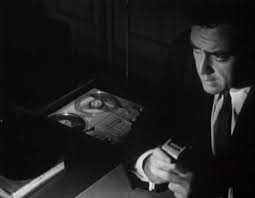Then there are the public domain movies -- orphans -- from Poverty Row studios no longer in existence. Low budget to begin with, these movies have been around the block more than once and show their age. Lacking a negative or a clean original print, these pictures still have the faded, battered look people were used to when TVs were connected to rabbit ears. Their overall cheapness takes on a dreamlike -- nightmarish, really -- quality not necessarily intended. Yet this often works when it comes to B-movies, film noir-wannabes in particular. Movies like Monogram's Fear.
It's difficult to picture what Fear looked like during its original 1946 run, with the clarity and contrast that even low-budget movies like this had. Every scene, from the protagonist's apartment to the diner where he eats to the stationhouse, looks grimy. Even the nighttime scene at an innocent city park takes on a foreboding look, like a set from one of Monogram's monster movies (which it probably was).
 |
| Prof. Stanley is about to grade his last paper. |
Immediately coming under suspicion by Police Captain Burke, Larry plays it cool. But as Burke and his sidekick Detective Shaefer gradually turn the screws, Larry can find no comfort anywhere, even in the arms of his waitress girlfriend Eileen. When a simpleminded house-painter confesses to the crime, Larry feels he's gotten off scot-free. Relaxed at last, Larry decides to lam it out of town. Spotting Eileen on the next corner, Larry crosses the street, not looking at the traffic light or the truck heading his way...
 |
| "Why are we suddenly speaking Russian?" |
 |
| Larry orders the leg of Eileen. |
 |
| Darren McGavin, on the far right, suffers the indignity of being upstaged by actors nowhere near as good as him. |
Kolchak TV series, and everyone else as the father from A Christmas Story. Of all the college kids, McGavin alone shows any kind of real expression; his brief moments preview great things to come for him.
 |
| Eileen informs Det. Shaefer her boyfriend isn't on the menu. |
As usual, it's up to the police to clean things
up, both legally and, in this case, artistically. Nestor Paiva's Det. Shaefer is unsettling, a cop who turns up almost magically anywhere Larry happens to be, whether at home, the diner or the park. With an acting style as unusual as his name, Nestor Paiva looks like he should be in B-movies -- he doesn't have a face so much as a mug -- yet possesses the quality of an A-actor all the way. You notice him from the get-go, even start to look forward to his sudden, creepy appearances here. He completely outshines the rest of the major players in Fear...
 |
| "Hello, ladies! Like what you see?" |
Don't get me wrong; there's plenty to enjoy in Fear. The atmosphere. The audacity of Monogram going all Dostoyevsky on its unsuspecting audience. Warren William and Nestor Paiva. (Why does his name look like it's spelled backwards?) You can deal with the so-so actors who hog most of the camera time, because, well, it's a Poverty Row production, and actors who started there tended to stay there for a reason (Darren McGavin excepted). But that ending! That lousy, good-for-nothing ending! For that alone, there's no way any self-respecting movie fan could watch Fear more than once.
Just why the people involved thought this dream trope was a good idea is a mystery greater than any Monogram ever released. I keep hoping I'm dreaming it, and that I'll wake up to see Peter Cookson get mowed down by a truck, while Warren William heartlessly seduces and abandons Anne Gwynne before moving on to his next conquest. Now there's a movie worth re-watching.
********************************





























